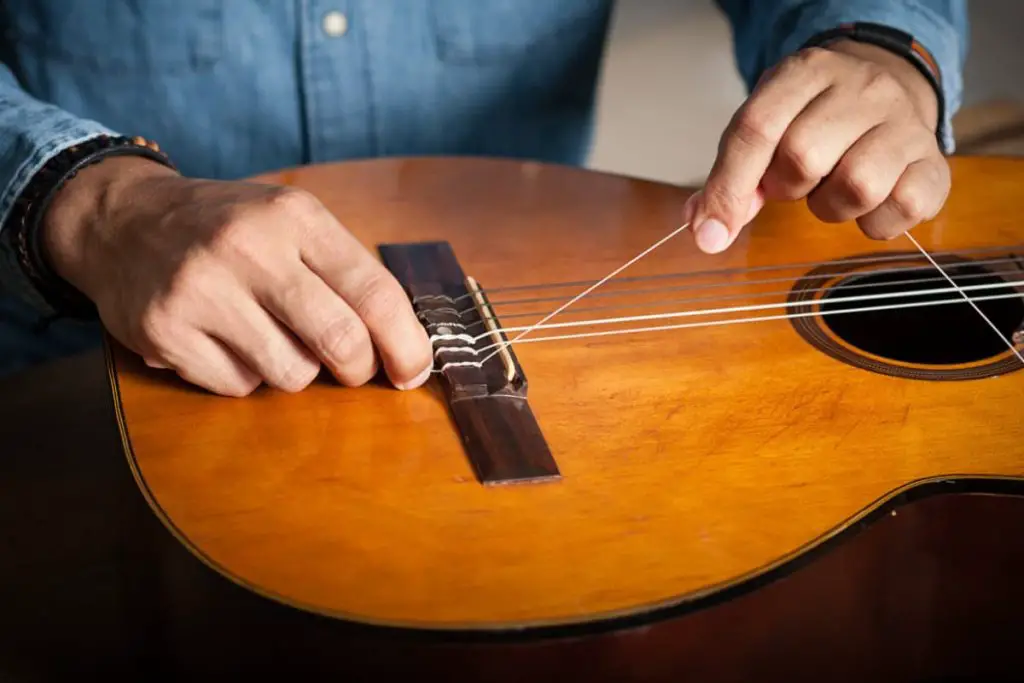Acoustic guitars are a classic instrument choice for many musicians, favored for their smooth tone and bold sound. However, it is not uncommon for guitar players to experience fret buzz. So why do your acoustic guitar’s strings buzz?
Here are 6 reasons why your acoustic guitar strings buzz:
- Humidity is too low.
- Your guitar strings are not the right thickness.
- Your guitar frets have worn down.
- You’re strumming too hard.
- You aren’t being firm enough while pressing down on strings.
- You’ve switched to a different guitar string brand.
The rest of this article will explain everything you need to know about acoustic guitar strings buzzing (You may want to consider: how much does fret leveling cost?), so you can identify the root cause behind this issue and fix it accordingly. Read on for the ins and outs of guitar strings buzz.
Note: Check out my blog post on the Best Acoustic Guitar Strings 2025 for the best overall.
👇😀👇NOTE👇😀👇
If you want to find out what my recommended guitar gear is, then here is what I recommend on Amazon:
- Fender Cutaway Acoustic-Electric Guitar Bundle (MY FAVORITE GUITAR)
- Snark SN-8 Super Tight All Instrument Tuner (Easiest Tuner I’ve Used😏)
- 6 String Acoustic Guitar Capo (Best CAPO for quick changes)
- Dunlop Max Grip 1.0mm Nylon Picks (Thick Guitar Pick So You Don’t Lose Grip!)
- Universal Guitar Stand (Cheap & Minimalist Guitar Stand I Recommend)
- Levy’s 2″ Wide Quick Adjust Guitar Strap (Best Guitar Strap For Any Level)

1. Humidity Is Too Low
One of the most common causes of fret buzz in acoustic guitars is unfavorable humidity conditions.
When the humidity of your environment is too low, the sound quality of your guitar might be affected regardless of how good you strum.
This is because low humidity levels make your environment dry, which in turn can dry out the wood of your acoustic guitar (Curious how to turn a right handed acoustic guitar left handed). When your guitar dries out, there will be a slight change in the shape of your instrument, which, more often than not, affects each individual part differently.
The slight change in shape can cause the neck to bend in a way that makes the frets stick out, effectively increasing the chances of buzzing.
So if you find your acoustic guitar strings buzzing more than usual, try checking your humidity levels. While there are multiple ways to do this, the most convenient and accurate way to measure a room’s humidity is by using a hygrometer.
A hygrometer reads your environment and displays the temperature and humidity of your space. The device is an excellent tool for any musician because these conditions can heavily affect the sound your instrument will produce. This is especially true for acoustic guitars because they are made of wood, which is easily affected by temperature and humidity changes.
If you’re considering making an investment in a hygrometer for your music studio or playing space, I highly recommend the Govee Hygrometer Thermometer (available on Amazon.com).
This hygrometer is BlueTooth compatible, so it can send advanced reports to your cellular device. It’s also affordable, small, and has a sleek design.
If your hygrometer tells you that your environment is dry, addressing humidity might make the buzzing decrease in intensity or disappear altogether.
Invest in a Humidifier To Avoid Dry Environments
As we previously discussed, an uncharacteristically dry environment can create unfavorable guitar playing conditions, which can lead to guitar strings buzz.
This is why buzzing is often more common during the winter months when temperatures and humidity levels are both low.
However, if you live in a region that is constantly dry, it might be a good idea to invest in a humidifier to balance out your environment. You can also use a humidifier exclusively during winter if the humidity in your area changes seasonally.
Investing in a humidifier is an excellent idea for players of any instrument, more specifically guitars. This is the quickest fix to most humidity problems, and humidifiers are easy to come by.
If you’re on the market for a humidifier, I highly recommend the LEVOIT Humidifier (available on Amazon.com) for its affordability, high functionality, and sleek design.
The humidifier is also small enough to fit on a shelf or a nightstand, which is super important if your music studio or playing area doesn’t have a lot of space to spare.
However, if you’re in a bigger space, you can always get a standing humidifier instead. The options really are endless, and I recommend exploring them if you think that humidity is the issue behind your acoustic guitar string buzz.
2. Your Guitar Strings Are Not the Right Thickness
Another common reason behind acoustic guitar string buzzing is using strings that are not the correct size.
No two guitars are the same, which is why acoustic guitars are set up with different string gauges. The thickness of your guitar strings can determine how much tension is put on the neck, which in turn affects how the neck bends.
Your guitar neck should be as close to straight as possible. If too much or too little tension is present, it can make your neck curve, which can change how your strings move and what they hit against while you’re playing.

Make Sure Your Guitar Strings Are the Right Size
One of the best things you can do to address acoustic guitar string buzz is to ensure that your guitar strings are the correct size.
This is important because size and thickness heavily affect your sound, as previously discussed. They determine the amount of tension that is placed on the neck of your guitar, which impacts your sound.
One way to solve this problem is by making sure your guitar strings are the correct gauge. Making truss rod adjustments can also help regulate string tension and therefore improve the sound. You can either do this yourself or seek out a professional for assistance.
If you need visual instruction, this helpful YouTube video explains how to make truss rod adjustments in simple terms:
3. Your Guitar Frets Have Worn Down
While humidity and string thickness are some of the most common factors behind acoustic guitar string buzzing, another frequent cause of this issue is the effect that uneven frets have on your playing.
As your guitar ages, it is subjected to more and more playing. Because of this, older guitars are often worn, and they can grow more worn down as they age and face routine wear and tear.
When you play any guitar, you have to press your fingers down on the strings. This can create friction and wear down the frets of your acoustic guitar over time.
While it might not seem like a few uneven frets are that big of an issue, this problem can actually play a significant role in the way your guitar sounds when played. This is because uneven frets can cause your acoustic guitar strings to buzz.
Have a Professional Help You Even Out Your Frets
One of the best things you can do to help address the issue of uneven frets and, ultimately, the issue of your buzzing is to have a professional help you level them out.
While this skill can be learned over time with practice, it can be tricky to get it right. Your best bet is to go to your local music store and seek help. A professional will know how to even out your frets so you can get back to playing without the annoyance of string buzz.
4. You’re Strumming Too Hard
Believe it or not, an additional cause to the issue of guitar string buzzing is how forcefully you play your instrument.
When you strum an acoustic guitar with too much power, the strings can vibrate more forcefully and hit against the frets, effectively increasing the chances of strings buzzing.

Strum Less Aggressively
The simplest solution is to retrain your playing habits and strum less aggressively.
While it seems like a simple solution, this is really important if you want to reduce the amount of buzzing your instrument produces while you play.
The best way to go about doing this is with practice. Try playing your guitar with less aggression until you are comfortable with this new habit. While it might take some retraining, it is possible as long as you practice frequently.
The trick is to keep practicing until your strumming becomes natural. On average, it should take you a couple of weeks or even months to develop the right strumming techniques.
However, if you still find that your acoustic guitar strings are buzzing too much, there might be another reason behind the issue that you need to address first.
5. You Aren’t Being Firm Enough While Pressing Down on Strings
Another widespread issue many guitar players face is not pressing down on the strings with enough firmness.
When you play the guitar– acoustic or electric– it’s vital that you press down on the strings hard enough. Pressing down without enough force can negatively affect your overall sound and create a buzz. This is because it can make your strings vibrate against the frets and produce a buzzing sound.
Work on Your Technique
One of the best ways to approach this issue is to simply press down on your strings harder. While this sounds self-explanatory, it plays a massive role in how well your guitar sounds.
However, if you struggle with this, it might be because your grip strength needs some improvements. You can strengthen it by playing your guitar more, but there are other ways to go about this.
Here are some ways to strengthen your hands so you can get a better grip on your strings:
- Try squeezing putty or stress balls throughout the day. By doing this, you can strengthen the muscles in your hands and train them to grip your guitar strings tighter. This is a great thing to do while working or watching TV.
- Type more frequently. Practicing typing skills is another excellent way to strengthen your fingers. You can do this while writing, gaming, or working throughout the day.
- Practice the piano. Playing the piano requires a good amount of strength in the hands to create certain effects and maintain a high-quality sound overall. Practicing your piano skills can definitely help you condition your grip.
- Make fists. Making tight fists and then releasing them can help you strengthen the muscles in your hands and train them to become increasingly flexible.
- Use hand grip strengtheners. Investing in hand grip strengtheners is an easy way to improve your grip. I recommend this KDG Hand Grip Strengthener (available on Amazon.com) because of its functionality and affordability.
However, your grip strength is not the only thing that determines how firmly you can press against your strings.
If you don’t have good guitar calluses, it can be tricky to play with the right amount of strength. It can also make guitar playing a bit painful, especially if you use an acoustic guitar instead of an electric one.
The best way to build guitar calluses is to practice (note that you need to be aware of guitar calluses peeling). Play as frequently as you can, and eventually, your fingers will become callused enough to protect you from the force of the strings against your skin.
You can also use a callus building tool, like this Ruff-Grip Callus Building Tool for Guitar Players (available on Amazon.com). I love this product because it makes it easy to build guitar calluses without needing to play constantly.
Sometimes, life gets in the way, and we don’t always have the time or ability to keep up with guitar practice. With a callus builder, you can keep your guitar calluses in top shape while away from your guitar.
By training your muscles to firm up your grip on your guitar strings and ensuring your fingers are calloused, you can significantly decrease the amount of buzzing your acoustic guitar strings produce.
However, if the issue persists, there may be other steps you have to take to fix different problems first. Refer to this article for more help on problem identification and solutions.
6. You’ve Switched to a Different Guitar String Brand
Another thing that can cause acoustic guitar buzzing is if you’ve switched to a different guitar string brand.
When you deviate from your guitar’s original setup with new adjustments or string types, this can cause a change in the overall sound of your instrument, including an increase in buzzing.

Experiment With Different String Brands
No two guitars are identical, even if they are the same make. While this is true in a manufacturing sense, additionally, this is heavily due to the fact that no two musicians are the same either.
Everyone has different preferences, setups, and play styles. All of these things can affect the way we play and the sounds we produce.
This is why it’s so vital for you to experiment with different brands of strings. If you find your acoustic guitar strings buzzing, try out a few other brands to see if any of them better suit your instrument in combination with your technique.
Keep note of the sound and feel that different brands produce. It might be a good idea to keep track of your findings with a pros and cons list.
If you find a brand of guitar strings that works better for your personal needs and produces less buzzing, stick to that brand in the future.
Is It Normal for Your Acoustic Guitar Strings To Buzz?
Fret buzz can be a pain if it isn’t something that suits your sound. Fortunately, if you find your acoustic guitar strings buzzing, you’re not alone, and there are many easy solutions to this issue because this problem is actually quite common.
It is normal for your acoustic guitar strings to buzz. While this issue can be frustrating as it can significantly impact your overall sound, it’s not an uncommon one. Many guitar players have to make seasonal adjustments as humidity and temperatures change to avoid buzzing.
It also becomes more common as your guitar ages because the more you play your instrument, the more worn your frets will become, and uneven frets can cause string buzz.
The good news is that you can easily make the necessary adjustments to have your instrument perform at a superior level. Consulting with a guitar technician can help address the issue if you’re not too conversant with guitar modifications.
Do Electric Guitar Strings Buzz Too?
Guitar string buzz is relatively common and often seasonal for many acoustic guitar players, but is it possible for electric guitar strings to buzz, too?
Electric guitar strings can buzz too. The buzz can be caused by aggressive strumming, a lack of firmness when pressing down on the strings, or pickups that are too high. As your guitar ages, your frets will wear down, which can often cause buzzing.
To fix buzzing electric guitar strings, try adjusting your pickups, so they pull on the strings correctly (relevant article: how to eliminate hum from guitar pedals).

Which Acoustic Guitar Produces the Least Amount of Buzzing?
While buzzing is a relatively common issue for many acoustic guitar players, certain brands buzz less than others.
While several acoustic guitars can produce a reduced amount of buzzing, the Taylor 214ce-K stands out as among the best on the market. It’s a high-quality instrument that is known for its good sound and reduced fret buzz.
The Taylor 214ce-K Grand Auditorium is an excellent choice for those who want to reduce buzzing while they play.
This guitar is excellent because it produces a low amount of buzzing. I also love that the materials are sustainably sourced. While it is a bit pricey compared to many student and beginner-grade guitars, you will definitely get the high quality you’re paying for with this instrument.
👇😀👇NOTE👇😀👇
If you want to find out what my recommended guitar gear is, then here is what I recommend on Amazon:
- Fender Cutaway Acoustic-Electric Guitar Bundle (MY FAVORITE GUITAR)
- Snark SN-8 Super Tight All Instrument Tuner (Easiest Tuner I’ve Used😏)
- 6 String Acoustic Guitar Capo (Best CAPO for quick changes)
- Dunlop Max Grip 1.0mm Nylon Picks (Thick Guitar Pick So You Don’t Lose Grip!)
- Universal Guitar Stand (Cheap & Minimalist Guitar Stand I Recommend)
- Levy’s 2″ Wide Quick Adjust Guitar Strap (Best Guitar Strap For Any Level)
Related Posts:
- 8 Best Acoustic Guitar Strings for Bluegrass
- 10 Best Acoustic Guitar Strings for Playing Blues
- 15 Best Strings For Acoustic Guitar Fingerpicking
- 15 Best Acoustic Guitar Strings
- Guitar String Tension Calculator
- Best Acoustic Guitars
- Best Acoustic Guitars Under $500
- Best Guitar Strings for Country Music
- Best Guitar Strings for Les Paul
- Best Guitar Strings for Bending
- Best Guitar Strings for Blues
- Best Guitar Strings for Fender Stratocaster
- Best Guitar Strings for Telecaster

